#posthumous diary
Explore tagged Tumblr posts
Text

ばぶちゃん | 死後日記 「CD, 2018」 | BABU-0005 ILLUSTRATION: TREVOR BROWN
61 notes
·
View notes
Text
Dear diary,
Shit's been getting weird. I should have known what I was signing up for when I decided I was going to carry on this business in the old man's stead. He had told me stories about operating in this city, but perhaps part of me believed he was exaggerating things. Hyperbole. Just for shock value and to keep the conversation going.
Yesterday, a body was dropped off anonymously by somebody who made damn sure that their identity wouldn't be discernable. Shadowy figure in a trenchcoat, all features obscured. The decedent had been some mafioso. You could tell by the expensive jewelry: the gold rings on his hands, the fancy watch, and his custom cufflinks.
His wife stopped by to see him, and it broke my heart. She sobbed into his suit, going on about their daughter and how she had wanted him to see her finish high school, be the first in her family to attend college, make something of herself. (The daughter in question had been too young to accompany her mother, having been dropped off with her uncle.)
I helped the widow to set up the embalming and burial arrangements. I've never been much of a physically affectionate type, but she surprised me with a hug on her way out the door and I couldn't just shove away someone who is grieving.
Later after she had left, sometime around 2 or 3 am, I was startled by a loud, insistent knocking on the door. Big guy, tough looking, very intimidating. He muscled his way in through the entrance, demanding to see the body that had been brought in earlier.
The way he dressed and the manner in which he had carried himself had also suggested mafia. I knew telling this guy no would have been hazardous to my health, and so I had no choice but to comply.
He produced a pair of dental pliers from his pocket, reached into the corpse's mouth, and got to work wrenching away at the dead man's mouth, extracting several gold teeth. I was so flabbergasted that I just stood there and watched with my mouth agape. He shoved a fat wad of cash into my hand and just left. No explanation.
I can only assume this man was from a rival family, knew the guy had a few gold teeth (which these sorts use as a symbol of status), and wanted them for himself, maybe as a sort of trophy.
I guess I have no choice but to continue with the widow's requested services without telling her what happened. It shouldn't matter, anyway, since I normally sew the mouths shut for presentation. You don't want a dead guy's mouth flopping open like a fish in the middle of the eulogy.
I don't know how to feel about all this. I feel… Conflicted. I know that we can't take material possessions with us when we go, so it's rather pointless to be buried with them. I'm also against the defilement of the dead. But this mobster left me with enough cash to cover services for a couple of deceased without going broke if the families can't pay.
#ic post#diary entries#cw mention of dead body#cw mention of defilement of dead body#cw posthumous removal of teeth
1 note
·
View note
Text
And here is the most devastating fact of Frank's posthumous success, which leaves her real experience forever hidden: we know what she would have said, because other people have said it, and we don't want to hear it.
The line most often quoted from Frank's diary are her famous words, "I still believe, in spite of everything, that people are truly good at heart." These words are "inspiring," by which we mean that they flatter us. They make us feel forgiven for those lapses of our civilization that allow for piles of murdered girls—and if those words came from a murdered girl, well, then, we must be absolved, because they must be true. That gift of grace and absolution from a murdered Jew (exactly the gift that lies at the heart of Christianity) is what millions of people are so eager to find in Frank's hiding place, in her writings, in her "legacy." It is far more gratifying to believe that an innocent dead girl has offered us grace than to recognize the obvious: Frank wrote about people being "truly good at heart" before meeting people who weren't. Three weeks after writing those words, she met people who weren't.
Here's how much some people dislike living Jews: they murdered 6 million of them. This fact bears repeating, as it does not come up at all in Anne Frank's writings. Readers of her diary are aware that the author was murdered in a genocide, but this does not mean that her diary is a work about genocide. If it were, it is unlikely that it would have been anywhere near as universally embraced.
We know this, because there is no shortage of writings from victims and survivors who chronicled this fact in vivid detail, and none of those documents have achieved anything like Frank's diary's fame. Those that have come close have only done so by observing those same rules of hiding, the ones that insist on polite victims who don't insult their persecutors The work that came closest to achieving Frank's international fame might be Elie Wiesel's Night, a memoir that could be thought of as a continuation of Frank's diary, recounting the tortures of a fifteen-year-old imprisoned in Auschwitz. As the scholar Naomi Seidman has discussed, Wiesel first published his memoir in Yiddish, under the title And the World Was Silent. The Yiddish book told the same story told in Night, but it exploded with rage against his family's murderers and, as the title implies, the entire world whose indifference (or active hatred) made those murders possible. With the help of the French Catholic Nobel laureate François Mauriac, Wiesel later published a French version under the new title La Nuit—a work that repositioned the young survivor's rage into theological angst. After all, what reader would want to hear about how this society had failed, how he was guilty? Better to blame G[-]d. This approach earned Wiesel a Nobel Peace Prize, as well as, years later, selection for Oprah's Book Club, the American epitome of grace. It did not, however, make teenage girls read his book in Japan, the way they read Frank's. For that he would have had to hide much, much more.
from "Everyone's (Second) Favorite Dead Jew" in People Love Dead Jews by Dara Horn, pp 9–10
#dara horn#people love dead jews#philosemitism#antisemitism#jumblr#שואה#elie wiesel#anne frank#noble savage trope#perfect victim#reading list
949 notes
·
View notes
Text
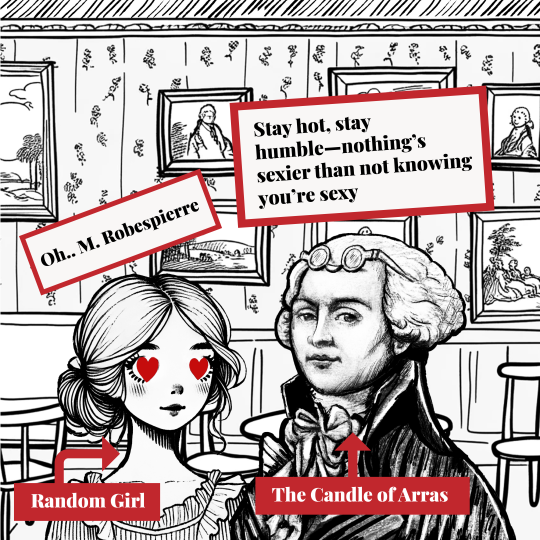
February has finally come to an end, and being the so-called "month of love" (or so the obscene number of pink Hallmark cards in supermarkets would have me believe), I thought—despite being very, very late for Valentine’s Day (when am I not late for everything?)—I’d take the opportunity to talk about Robespierre’s love life. Because surely, he had one, right?
Well... that depends on who you ask. Accounts of Robespierre’s romantic escapades range from total abstinence to secret debauchery and a supposed porn addiction, depending on which political or moral flavour the historian (1) writing the accounts subscribes to.
In case you’re dying of curiosity: there is precisely zero evidence that Maximilien Robespierre slept with anyone—man, woman, or even himself. Nothing. Nada. Zilch.
Does this mean he didn’t? Was he asexual? Abstinent? Just busy?
No. It simply means that if he did have any romantic or sexual encounters, he was extremely discreet about them (and why wouldn’t he be? It’s not as if he’d start randomly monologuing about his love life mid-speech at the Convention or the Jacobins).
As for his relationships with women, here’s what we do know:
As a politician, he was wildly popular with women, to the point of receiving marriage proposals in the mail.
He never married, and while rumours of his engagement exist, they remain just that—rumours. He died at 36, unmarried, childless, and leaving behind no diary or trove of love letters to illuminate his feelings.
He has been posthumously linked to three women: Anaïs Deshors, Éléonore Duplay, and Annette Duplessis. However, these claims are flimsy at best, often put forth by people with their own agendas.
He did, however, write love poems to several women in Arras: a Miss Orptelia Mondlen, a Mlle Henriette, an Émilie Demoncheaux (on the eve of her wedding, no less), and a certain Sylvie.
In short, if we want to find any direct evidence of Robespierre’s feelings towards women, we have to turn to his poetry. And since this is Robespierre—where everything must have some kind of political dimension—let’s talk about how his one publicly released love poem was used against him in the monarchist press.
Robespierre’s Love Poems
As mentioned, a number of love poems have been attributed to Robespierre, though not always convincingly. He wasn’t particularly eager to see them published, and only one ever made it to the general public during his lifetime—both times without his consent.
The poem in question is a madrigal dedicated, according to the Œuvres, to a “Miss Orptelia (possibly Ophelia?) Mondieu.” It was first published anonymously in 1787 in two different collections, without Robespierre’s knowledge. Later, it was republished—again without his consent—by the royalist writer François-Louis Suleau (2), who used it to mock him.
Here’s the poem:
Madrigal
Crois-moi, jeune et belle Ophélie, Quoi qu’en dise le monde et malgré ton miroir, Contente d’être belle et de n’en rien savoir, Garde toujours la modestie. Sur le pouvoir de tes appas Demeure toujours alarmée Tu n’en seras que mieux aimée, Si tu crains de ne l’être pas.
And my translation:
Madrigal
Believe me, young and beautiful Ophélie, No matter what the world may say, and despite thy looking-glass, Content to be beautiful yet know naught of it, Keep thy modesty always. Be ever wary of the power of thy charms; Thou shalt be all the more loved, If thou fearest not being unloved.
Baudelaire, he is not. But it’s charming in its own earnest, slightly awkward way, no? Hardly the stuff of grand, sweeping romance, but if someone wrote this for me, I’d at least pretend to be flattered.
So why was it mocked? Well, for Suleau and his fellow scribes at Actes des Apôtres (3), this was an opportunity far too delicious to ignore.
The Mockery of Suleau
In a November 1789 issue of the paper, Suleau went after Robespierre with sharp sarcasm, mocking him over a minor linguistic mistake in one of his speeches—using "aristocrassique" instead of "aristocratique"—and dismissing him as a mere "poor scholarship student," while feigning an air of condescending generosity. Then came the poetic insults: Suleau sarcastically presented the madrigal as a work of supreme literary genius, only to rip it apart.
He compared Robespierre’s writing to Tacitus, only to immediately undercut the compliment by drawing a parallel to Montesquieu—before mockingly dismissing the comparison, given Montesquieu’s "aristocratic tendencies."
The pièce de résistance? A biting final flourish in which he ironically declared Robespierre a polymath—poet, historian, geographer, naturalist, physicist, journalist, legislator—before delivering the ultimate insult: if Mirabeau was the “torch of Provence,” then Robespierre was merely the “candle of Arras.”
In case it wasn’t obvious, this had little to do with Robespierre’s poetic talents and everything to do with his politics.
Robespierre’s Response
How did Robespierre react? He didn’t. Not a word—not even to disavow the poem. Clearly, he subscribed to the "don’t feed the trolls" school of thought.
The fact that he didn’t deny authorship was enough for historians like Eugène Déprez (who compiled the first volume of Robespierre’s Œuvres Complètes) to confidently attribute it to him.
What Do His Poems Tell Us About Him?
Is that enough proof? Debatable. But even if we accept that Robespierre wrote this madrigal and the other five attributed love poems (mediocre as they may be), what do they actually tell us about him?
His greatest fan, historian Albert Mathiez, thought these poems proved that "far from possessing a barren heart, as some have claimed, he was endowed with a trembling sensitivity and by nature sought the company of the fairer sex."
Did he? Do these light verses really reveal that much?
Personally—and this is just an opinion, because when it comes to Robespierre’s love life, opinions are all we have—I think what these poems tell us most is that, back in the 1780s, Robespierre understood what was expected of a proper gentleman and was trying to play the part. In short, he was capable of fulfilling societal expectations.
That doesn’t mean he never had romantic feelings, but as far as we know, despite the interest some women clearly had in him, none of these romantic fantasies ever became anything more than words on a page.
Note (1) Frankly, the word "historian" is no guarantee of quality research when it comes to the French Revolution).
(2) François-Louis Suleau, a royalist journalist who attended school with Robespierre and Desmoulins, later becoming one of their most vocal critics.
(3) Actes des Apôtres was a royalist newspaper published during the early years of the French Revolution. Founded in 1789 by Jean-Gabriel Peltier and featuring contributors like François-Louis Suleau, the publication served as a satirical and polemical counter-revolutionary voice. It's actually quite funny to read.
137 notes
·
View notes
Text
Reading Friday Saturday
Thanks for the tag @emmathefanficgal ! I’m always on the hunt for new books, so I always love to see what others are reading!
As for what I’m reading:
I just finished my annual re-read of the Silmarillion. I am more invested in Gwindor than ever, I just love that poor sweet elf so much.
My book club is currently reading Remarkably Bright Creatures by Shelby Van Pelt. I’ve really just started so no firm opinions yet, but I do enjoy that some of the chapters are written from the POV of an octopus.
I have a library hold on The Mercies by Kiran Millwood Hargrave to read next, which was recommended to me (thank you @lady-of-ithilien !) as being similar to all time fave Matrix by Lauren Groff.
I am feeling ethically conflicted about Joan Didion’s “Notes to John,” which comes out later this month. It’s essentially a selection of her journal entries, published posthumously. And while I freakin’ love Joan Didion and would die for more of her writing, I’m not sure how I feel about publishing a personal diary without consent so soon after someone’s death.
No pressure tags to @dancerinthestorm @lady-of-ithilien @hastyhobbit
107 notes
·
View notes
Note
ive been wondering, how is Machete remembered in the future, like, does history even remember him? are there articles about him? is his life speculated upon?
I couldn't find the post where I touched upon this before, but a few months ago there was some talk of how he might be viewed in modern times. Machete was a very private person, I don't think he would've kept journals or diaries, and he did his best to cover his tracks so I doubt he would leave behind a lot of information about his personal life. A number of second hand accounts about him would most likely be tainted by his unfavorable public image, at least those dating to his final inquisition years.
The nature of his relationship to the Florentine politician Vasco della Gherardesca might be a topic of discussion in some circles, some historians would strongly suspect that they were lovers and others would adamantly dismiss such theories. I suppose there wouldn't be proof unless parts of their extensive correspondence survived to modern day, or some of the artwork Vasco commissioned after his death.
I remember someone suggesting that perhaps they would be mentioned in an occasional video essay or podcast, in a list of historical figures who might've been lgbt maybe, and I found that terribly wholesome. It's heartwarming to think that they would posthumously be granted some of the understanding and support they didn't get enough during their lifetime.
381 notes
·
View notes
Text
writing fictional Wikipedia articles as outlines for my historical fiction characters and having so much fun. dude look at this:
Daniel Ivey Clairville (3 May 1856 - 5 December 1941) was a prominent figure in the field of animal husbandry, early adopter of germ theory, animal behaviorist, cattle drover, diarist and Quaker theologian. Born in Philadelphia, Clairville apprenticed as a farrier until the death of his father in 1871 caused him to relocate to Texas to seek employment along the Chisholm Trail. Clairville was known for his ability to slow and halt the spread of disease among cattle using sanitation methods he pioneered, reducing cattle loss by up to 60% in herds under his care.
After retiring from the cattle industry in the late 1890s, he attended Cornell University, becoming an adjunct professor at Elgin Polytechnic Institute and publishing several texts on bovine husbandry and behavior.
Clairville was a relatively obscure scientific figure before his private writings about his sexuality, faith and experiences in the waning days of the Wild West were published posthumously.
^ Personal life
Clairville was gay and in a committed relationship with Joseph “Shortie” Alcott (14 November 1860 - 17 July 1906) until the latter’s mysterious death in Texas. Alcott was a train robber, outlaw, gambler, duelist and suspected serial killer. The couple met in the mid-1880s after Alcott was released from Utah Territorial Penitentiary and joined a trail drive lead by Clairville. Their relationship was described as inseparable but contentious by John Matthew Robertson-Clairville, Clairville’s adopted son, who often wrote about the couple’s relationship in his trail diary.
Having worked side by side for over a decade, Alcott initially followed Clairville east when he retired from the cattle industry in the 1890s but became embroiled in legal trouble in Pennsylvania and returned to Texas where he embarked on a crime spree that ended in a fatal two day shootout with a number of Texas rangers.
The details of Clairville’s private life and his connection to notorious criminal Shortie Alcott were largely forgotten until the 1970s when a box of personal letters and diaries was discovered in the attic of his former residence. The diaries of Clairville and Robertson-Clairville along with the correspondence between Clairville and Alcott in the latter’s final months form the basis of the book published by his great granddaughter in 1996.
Analysis of his writings and first hand accounts of his behavior suggest he had autism and OCD.
127 notes
·
View notes
Text
Hello and happy Pride Month everyone ! 🏳️🌈
As promised, I am going to talk about an important lesbian in history everyday. And this first post is about one of my favourite :
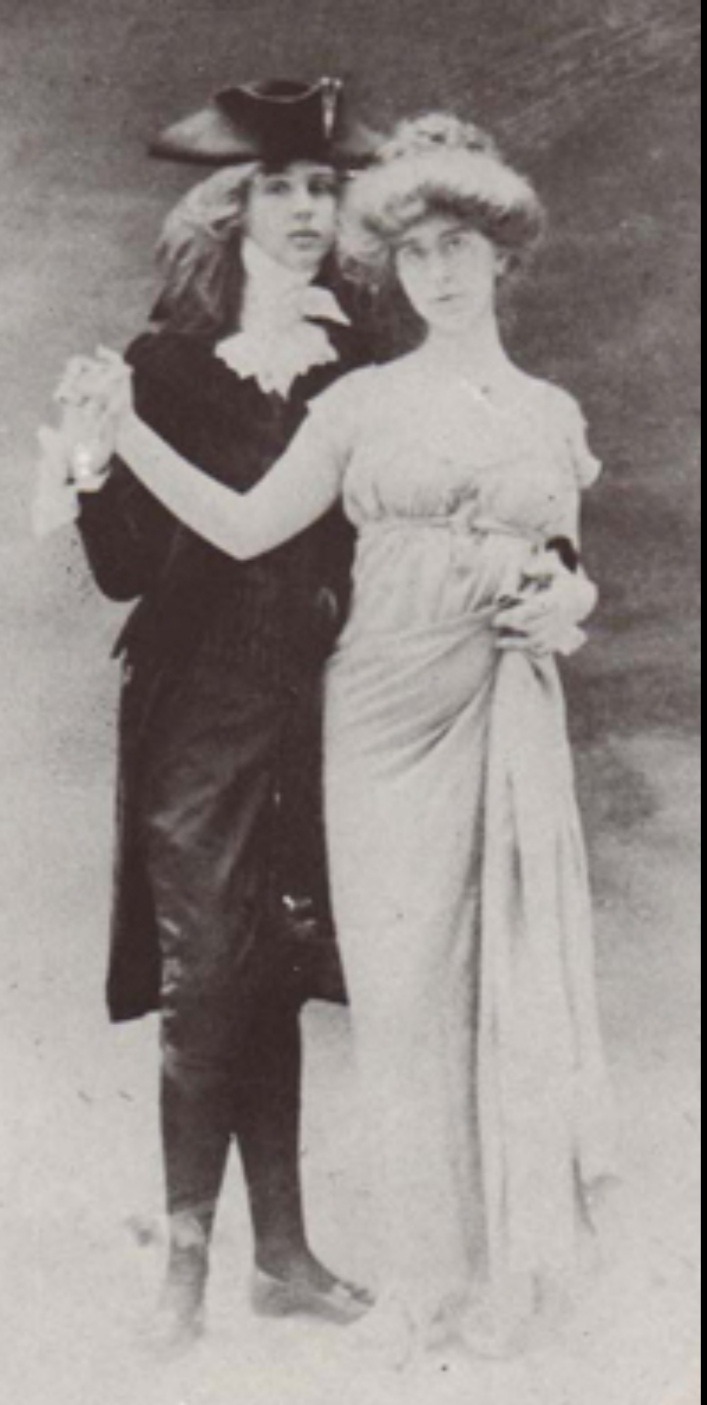
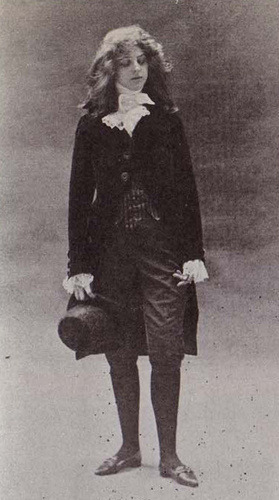
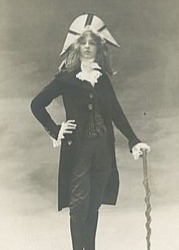
Renée Vivien !
I have seen some people talk about her here but she clearly isn’t as famous as she should be, and she deserves way more recognition!
Renée Vivien, whose birth name is Pauline Mary Tam, was a British writer poetess, who wrote her poetry (and most of her works) in french ; born in 1877, she died in 1909, at only 32 years old.
Renée was openly a lesbian, and she never tried to hide it despite the society she lived in being extremely homophobic and considering homosexuality as an illness. In her poetry, she mentions her love for women a lot, and wrote a lot of love poems for several of her lovers. This even earned her the nickname “Sappho 1900”. ("Sappho 1900, Sappho cent pour cent").
Of Sappho, she was by the way a huge fan : in 1903, she published the work "Sappho", in which the poet's Greek texts are followed by a French translation, as well as verses by Renée Vivien, which thus "completes" the remaining fragments of Sappho's writings. This collection greatly helped to anchor Sappho's work and her identity as a lesbian woman in our culture.
Her work consists of :
Twelve collections of poems, totalling more than 500 poems
Several translations of Greek poetesses (including Sappho)
Seven books of prose
Around ten novels (written under various pseudonyms)
A posthumously published collection of short Gothic tales (written in English this time)
A book about Anne Boleyn's life
It is also possible to read her diary and the letters she exchanged with her lovers, friends and other personalities of her time, including Natalie Clifford Barney, Colette, Kérimé Turkhan Pacha and others.

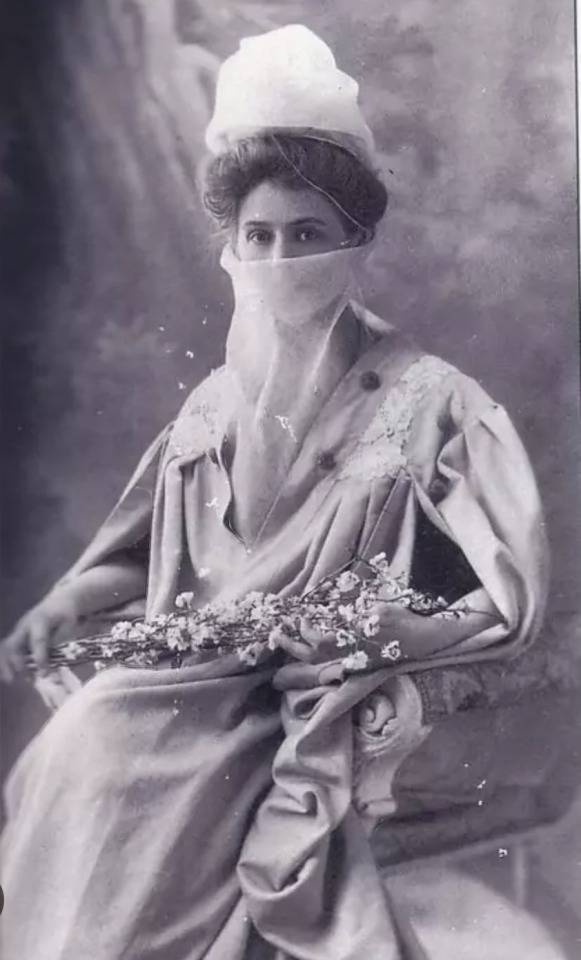
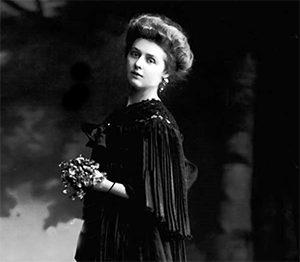
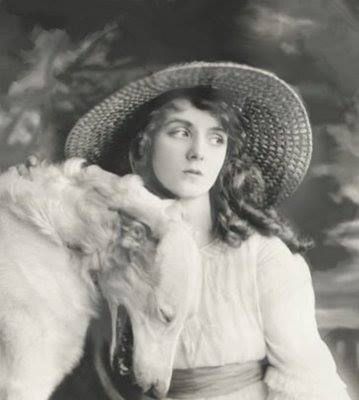
Pauline studied both in Paris and in London, then decided, once she came of age, to come and settle in Paris. She published her first collection,"Études et Préludes" in 1901, under the pseudonym R.Vivien. This pseudonym later became René Vivien (the male version of Renée) then Renée Vivien, the name under which she will be remembered. We can easily guess that she first chose these neutral then masculine pseudonyms to be able to write and be published despite the misogyny and homophobia of her time, especially given the themes exploited in her writings.
Sadness, death, ancient Greece, love, despair, solitude and love are the most recurrent themes in Renée's poems. There is actually a poetry prize in her name, the Prix Renée Vivien, which rewards poets whose themes and style are close to those of Renée Vivien.
Among Renée's best-known lovers is Natalie Clifford Barney, a famous writer and poet, with whom she had a relationship for several years before leaving her, tired of her infidelities. It is said that Natalie never accepted this breakup and tried until the end to get her back by all means, sending her love letters even years after.
Renée then had a relationship of more than six years with the rich Baroness Hélène de Zuylen, married and mother of two children, with whom she traveled extensively around the world and collaborated on the writing of several works (under the collective pseudonym Paule Riversdale). In a letter to her friend Jean Charles-Brun, Renée admitted that she considered herself married to Hélène.
While still living with the Baroness, she received a letter from a mysterious admirer, Kérimé Turkhan Pacha. What followed was an intense four-year epistolary relationship, interspersed with brief clandestine meetings. In 1908, however, Kérimé, the wife of a Turkish diplomat, put an end to their relationship when she had to follow her husband to St. Petersburg. This break-up probably contributed to Renée's tragic end.
The writer was in deep psychological distress, which only worsened from 1908 onwards. Alcoholic and suicidal, she began refusing to eat properly, and attempted suicide with laudanum. After this failed suicide attempt, she contracted pleurisy, which left her very weak, and then chronic gastritis due to her alcohol abuse. She gradually fell into anorexia, and, with her limbs paralyzed by multiple neuritis, she died on November 18, 1909, aged just 32. Her death was attributed to "pulmonary congestion", probably due to pneumonia complicated by alcohol and anorexia.
After her death, intellectuals, artists and newspapers, out of lesbophobia, tried to make her forgotten by the literary world, describing her as a woman of evil and damnation, perverse and cruel, going so far as to invent for her a life of crime, debauchery, orgies with married women, violence and cocaine consumption.
Today, Renée Vivien's name is no longer known to the general public, and is never mentioned alongside those of great ans famous poets such as Arthur Rimbaud or Charles Baudelaire, despite her gorgeous poetry, her immense talent and fascinating work.
She's personally my favourite, and not only because she was a lesbian. Her poetry is the most beautiful, interesting and deep poetry I have ever seen. She deserves to be as famous as Victor Hugo or Paul Eluard (and even more famous, in my opinion lol).
Here is one of her poems, with its english translation :
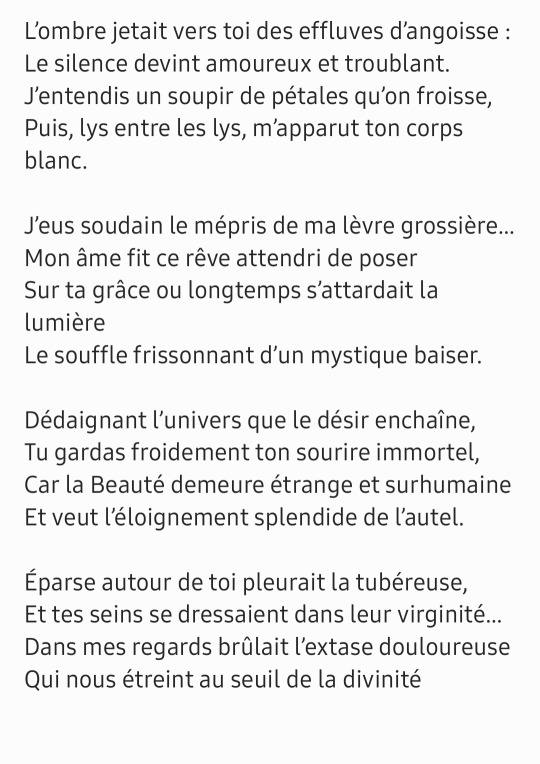
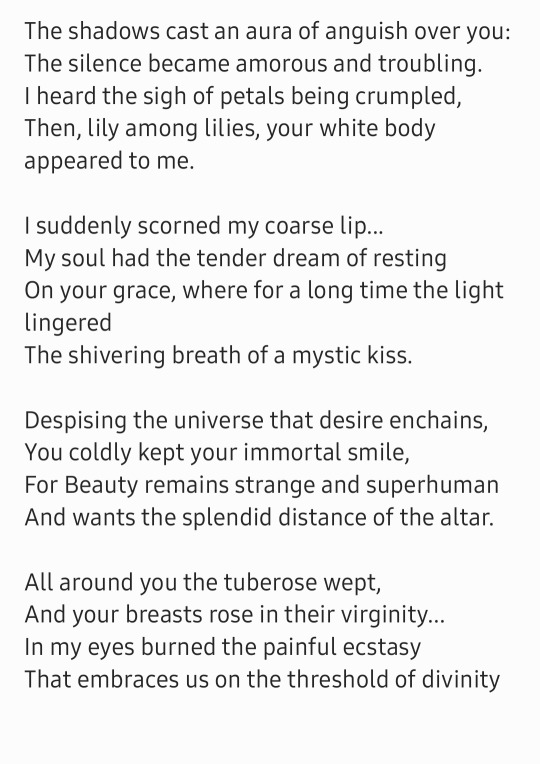
A link to some of her poems (in french but you can use a translator) ;
And two links with some of her poems translated into english : 1 and 2.
You should totally buy and read her books and poems, I have them and they're amazing!!! I'll post more translations of her poems in the future for those interested.
Anyway, thanks for reading and see you tomorrow for the second post!
#lesbian#renée vivien#renee vivien#pride#pride month#poetry#french poetry#poésie française#poésie#female homosexuality#female homosexual#lesbian history#lesbian artist
338 notes
·
View notes
Text
Apollo Cabin Camper headcanons
Lee was an avid writer, and was planning to go for a Creative Writing before he, you know, kicked the bucket. Michael and Will ended up posthumously publishing his diary as a fiction story (because monsters and all) so that he could have his dream of being a published author. Nico brought Lee a copy in the Underworld.
Michael would only ever call his younger siblings his "little siblings" despite the fact that most of them passed him in height at like 9 or 10.
Will has Michael and Lee's names tattooed on his wrist in their handwriting, as well as a quote from one of Lee's poems on his forearm.
Kayla's known she was a demigod since she was really young, since her father had to explain why she has no mother. Darren could see through the mist, and would just shoot the monsters that came because of Kayla's stronger sent.
Kayla was brought to camp by Hedge when he was in Toronto in TLO (is this a common hc? I feel like it should be)
Austin could play any instrument, except the kazoo. For some reason, he sucked at playing the kazoo.
Jerry's accent was so strong his first summer at camp no one could understand him except for the other internationals.
Yan would hide in the armory with their book so that they didn't have to do sword-fighting or archery practice
Gracie would make rainbow loom bracelets for literally everyone. Even though she came to camp after the Battle of Manhattan and the Battle of the Labrynth, she still made bracelets for her deceased siblings based on Will, Kayla, and Austin's description of them.
Will was protective of the chariot in TLH not because he cared about it, but because Michael cared about it
Lee was born in Connecticut, but lived practically his whole life in NYC, and Michael was from Maine.
The cabin has a world map with push pins indicating where everyone is from. Every camper has also signed the wall around it on the day they were claimed, so there's well over a thousand names by the time PJO takes place.
Cabin 7 has a music room in it's basement, that has every single instrument you can imagine. (Austin is banned from playing the kazoo of course)
The only way the cabin can be cleaned is if It's A Hard Knock Life (Broadway version) (and the reprise as well) are playing. The youngest kid sings at Molly, and they play rock paper scissor to figure out who jumps in the laundry basket like Annie (one time Michael accidently fell asleep and was brought to the laundry room by the harpies. He did not let Lee hear the end of it) (The same thing almost happened to Gracie, but Will found her before the harpies could)
It's tradition that the last day of camp the younger campers write a song for their counselor and play it before bed. There's a binder of all the lyrics of every song dated back to the 1940s on the shelf, when the tradition was started
I'm not even sorry about how many there are, I'm just a tad bit obsessed with Cabin 7 (as indicative of my ao3 fics dedicated to them all)
(Octavian's a legacy and I'm only 150 pages into my reread of Son of Neptune, I can't remember if there are any canon Apollo kids barring Octavian's ancestors.)
#cabin 7#apollo cabin#trials of apollo#michael yew#will solace#lee fletcher#jerry (percy jackson)#yan (percy jackson)#gracie (percy jackson#apollo#percy jackson and the olympians#heroes of olympus#the sun and the star#austin lake#kayla knowles#octavian (percy jackson)
312 notes
·
View notes
Text
Here are my resolutions for the next 3 months; the next lap of the year. To have none. Not to be tied. To be free & kindly with myself, not goading it to parties: to sit rather privately reading in the studio...Sometimes to read, sometimes not to read. To go out yes – but stay at home in spite of being asked. As for clothes, to buy good ones.
— Virginia Woolf, on January 2, 1931 in "A Writer's Diary: Being Extracts from the Diary of Virginia Woolf", compiled and edited by her husband, Leonard Woolf, and published posthumously in 1953 by Harcourt Brace Jovanovich.
35 notes
·
View notes
Text
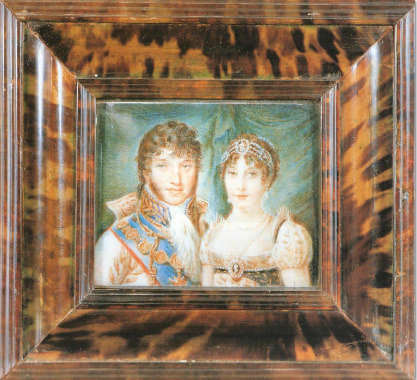
Happy Birthday to both Caroline and Joachim Murat, royal couple of Naples!
-
I think I may have translated some of this before, but as it's Murat's birthday: Sir Robert Wilson on meeting Murat in the final days of the Empire, in late March 1814, translated from his Diary, Volume 2.
Entry 29 March:
[…] At midday I went with Lord William, and was introduced to Murat. He received me very amicably; and we had more than an hour's very interesting conversation on past military events, particularly those relating to the Russian campaign; and I acquired some valuable information on that subject. Murat's dress was singular. Hair curled in Roman coiffure-two ringlets, or what, à la Parisienne, are styled "pensées," dependent on each shoulder. Blue uniform coat, red pantaloons, yellow shoes, with spurs; sword, with three pictures in the handle. His countenance martial, his manners soft, his conversation easy and intelligent. I reserve further opinion until I have transacted business with his Majesty. […]
Those yellow shoes and boots Murat loved to sport and people mention so much really must have been something else…
Wilson adds some more on 30 March:
[…] In the evening went to the opera. Murat was seated as a Sultan - princes and dukes all standing behind his throne-chair. He is by far the best actor that has appeared in the royalty theatre.[…]
And on 1st April:
On the evening of the 29th, at half-past six, I was at the dinner-table with Murat. The banquet was according to all the rules of perfect gastronomy. The master's manners were very gracious. It was impossible for Lord Chesterfield to have done the honours better. A certain high personage in England would, I am sure, ever feel a little jealous of his kingly courtesies. There was somewhat more of ceremony in the arrangement of the table than I ever witnessed before. in royal fêtes. Murat occupied one whole side himself. Three persons sat opposite, and two at each end. With the exception of this distinction, there was no extraordinary attention paid to him, and the conversation was as general, fluent, and free as in private society. After dinner was over we remained talking till near eleven o'clock. I fought with his Majesty all the battles over again which we had witnessed together. He was exceedingly interesting, very candid, and by no means a Gascon for himself or his brethren in arms. I profited by this opportunity again to acquire information on various subjects which he was best qualified to give, and which may tend to make a posthumous memorandum of the late campaigns more valuable.
19 notes
·
View notes
Photo
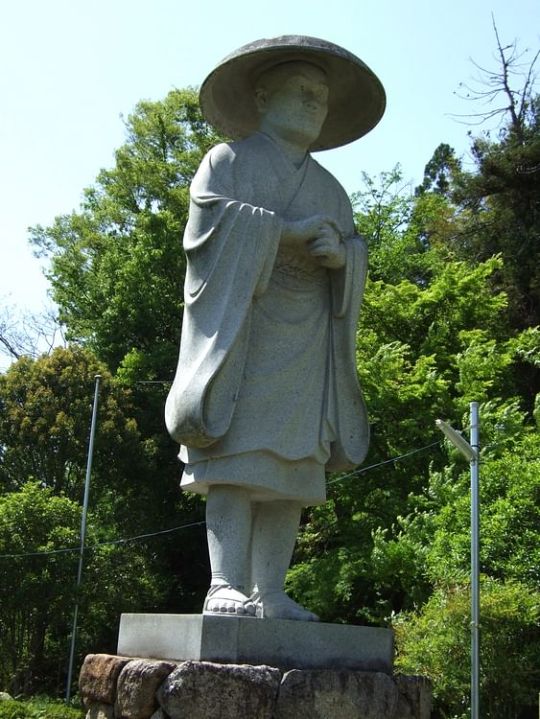
Ennin
Ennin (c. 793-864 CE, posthumous title: Jikaku Daishi) was a Japanese Buddhist monk of the Tendai sect who studied Buddhism at length in China and brought back knowledge of esoteric rituals, sutras, and relics. On his return, he published his celebrated diary Nitto Guho Junrei Gyoki and became the abbot of the important Enryakuji monastery on Mount Hiei near Kyoto and, thus, head of the Tendai sect.
Tendai Buddhism had been introduced to Japan by the monk Saicho, also known as Dengyo Daishi (767-822 CE). Based on the teachings of the Chinese Tiantai Sect, Saicho's simplified and inclusive version of Buddhism grew in popularity, and its headquarters, the Enryakuji complex on Mount Hiei outside the capital Heiankyo (Kyoto), became one of the most important in Japan as well as a celebrated seat of learning. Ennin became a disciple of Saicho from 808 CE when he began to study at the monastery, aged just 14.
Travels to China
Ennin was selected as part of a larger Japanese embassy led by the envoy to the Tang Court, one Fujiwara no Tsunetsugu, to visit China in 838 CE and study there. The main aim was for Ennin to study further the Tendai doctrine at the T'ien-t'ai shan. Ultimately, he would stay there for nine years, studying under various masters and learning in greater depths the tenets and rituals of Buddhism and especially the mysteries of Mikkyo, that is esoteric teachings known only to a very few initiated priests.
On arrival at Yang-chou and awaiting to be taken to T'ien-tai shan, the monk wasted no time and there and then found priests to teach him shitan, the Indic script used in esoteric texts. He also made his own copies of such texts and underwent an initiation with a priest called Ch'uan-yen. As it turned out Ennin did well, for by the time the Chinese authorities had organised his transport to his original destination he was informed there would be no time to do so if he were not to return to Japan as planned with the embassy. Ennin decided to stay and passed the winter at a monastery in Shantung run by Korean monks.
In the spring Ennin set off for Wutai, an important pilgrimage site and home to some more learned monks who could help satiate his thirst for Buddhist knowledge. Mount Wutai, where the bodhisattva Manjusri was thought to have appeared, was also a centre of esoteric cults. Over the next 50 days, Ennin acquired such techniques as rhythmically chanting the name of Amida Buddha and changing the intonation each repetition.
From 840 to 845 CE Ennin then studied at Ch'ang-an, learning more of Mikkyo, copying texts and mandalas, and being initiated by three different esoteric masters, going beyond the level that the recognised Japanese master and foremost expert Kukai had reached. In 845 CE Ennin, like many Chinese monks, suffered the persecution of anti-Buddhist emperor Wu-tsung, and he was compelled to return to Japan. This was easier said than done and it took two years, the death of Wu-tsung, and a general amnesty for him to finally find a ship that would make the voyage.
Continue reading...
30 notes
·
View notes
Text
Which couple from another text, narrative, and story most reminds you of Anidala and why?
(This prompt was posted by @skywalkr-nberrie in the wonderful Anidala Forever Support Group.)
I’m sure this was a hard question for others, but for me there was no contest. There was one fictional couple that immediately came to mind for me and trumped all others. In fact, I already made a post saying that I thought they were similar to Anidala here, although I didn’t really go into specifics.
That couple is none other than Malcolm Fade and Annabel Blackthorn from Cassandra Clare’s The Shadowhunter Chronicles.
Malcolm and Annabel first meet when they are both eight and Malcolm is bought by Annabel’s family to be their unpaid servant/slave. The Blackthorn family even go so far as to add their last name to his.
Despite the fact that he’s a literal monster in the eyes of her people, Annabel quickly befriends Malcolm, comforting him when her brothers and the servant children bully him for his demonic heritage and magic powers. Annabel is mentioned by name on the first page in the first of a series of diaries Malcolm wrote while he was growing up.
As Malcolm and Annabel weren’t allowed to speak to each other and spend as much time together as much as they wanted to, they often communicated by leaving letters in a statue of a boy with a raven in the Blackthorns’s garden.
They grow up and they fall in love.
He wrote her funny and amusing stories; she sketched and painted him.
Malcolm built Annabel a cottage far away from her family that was protected by magical enchantments and charms and overlooked the ocean because he knows Annabel loved it so.
As he grew up, Malcolm grew worried that he won’t be strong enough to protect her if their relationship comes to light, so he goes looking in the Downworld for something or someone he can make a deal with.
He finds the Unseelie King, a faerie ruler of immense power who’s willing to make a bargain. If they can bring him the Black Volume of the Dead from the Cornwall Institute he’ll protect them from the Shadowhunters.
Malcolm agrees, wishing against all hope that they’ll never have to.
He doesn’t get his wish.
When they’re somewhere between nineteen and twenty, Annabel’s family discovers their relationship and throws Annabel out, not wanting to have a “tainted daughter”.
Malcolm and Annabel spend a few days together in their home before Malcolm decides he has to take the King’s offer, he has to do whatever it takes to protect her.
He doesn’t tell Annabel about what he or the King plans to use the Black Volume for. She goes with him anyway.
They get captured, separated, and imprisoned within the Silent City.
Malcolm is broken out of prison by a faerie loyal to the Unseelie King.
Annabel is tortured into insanity by the Inquisitor for information she does not have. She does not want to believe that Malcolm has abandoned her. They make her.
Annabel is delivered to her family. They bury her alive in her family tomb, intending for her to die there for her crimes — literal and societal.
She does.
Annabel’s family spreads the rumor that she willing chose to leave Malcolm and become an Iron Sister due to her shame of loving a Downworlder.
Posthumously, Annabel becomes the basis for the Shadowhunter fable and ghost story about the tragic love between Lady Midnight (a nickname that Annabel held in life due to her long, dark hair) and her forbidden lover. According to the story, Lady Midnight fell in love with some she wasn’t supposed to love so her family sealed her in a castle of iron and left her to die. The story say that when the wind’s just right you can still hear her screaming, sobbing for her lover to return.
It breaks Malcolm’s heart when he hears of Annabel’s supposed decision, but over time he comes to accept this as her choice, content with believing that she’s happy as an Iron Sister. But he never truly moves on, planning to sneak into the Adamant Citadel when she eventually dies and laying next to her for all eternity or until he dies too, whichever comes first.
In the early twentieth century, Malcolm becomes the High Warlock of London and has to work with the inhabitants of the London Institute although he largely distrusts Shadowhunters and thinks the Shadowworld and the Downworld should remain separate.
(And then I got really tired of typing so I just started screenshotting wiki pages, sorry 😭)
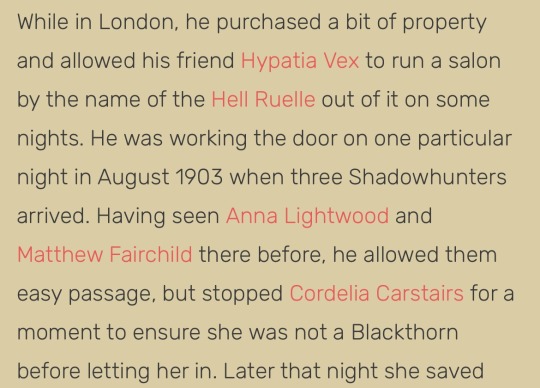
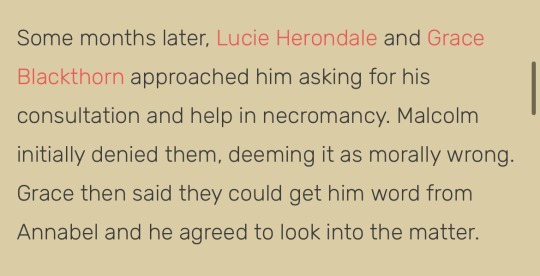
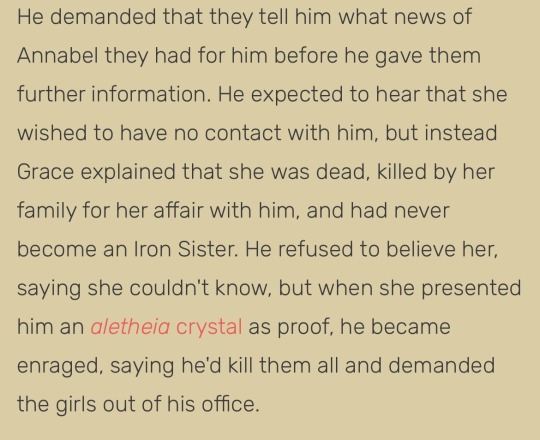
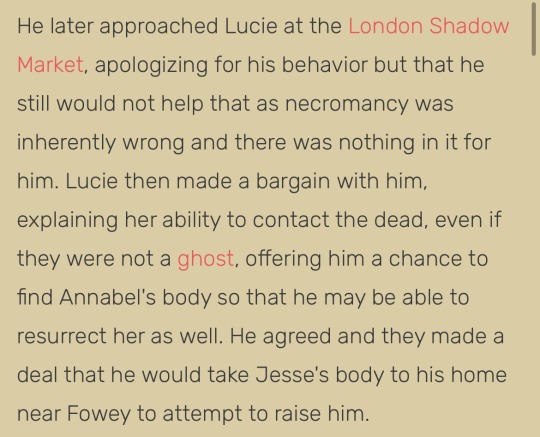
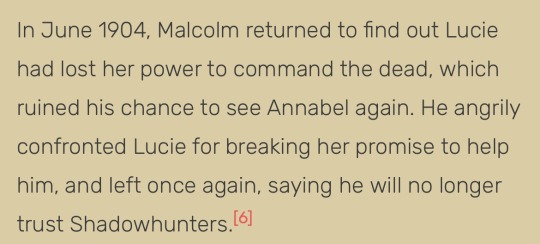
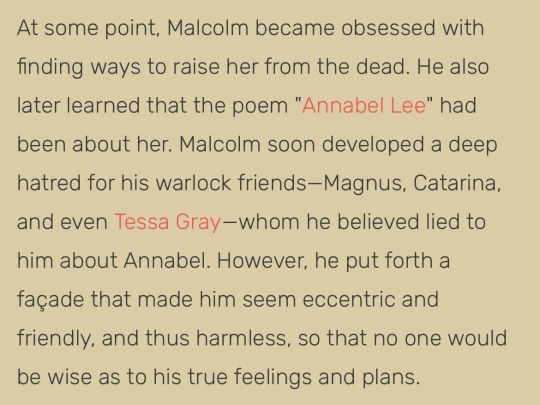
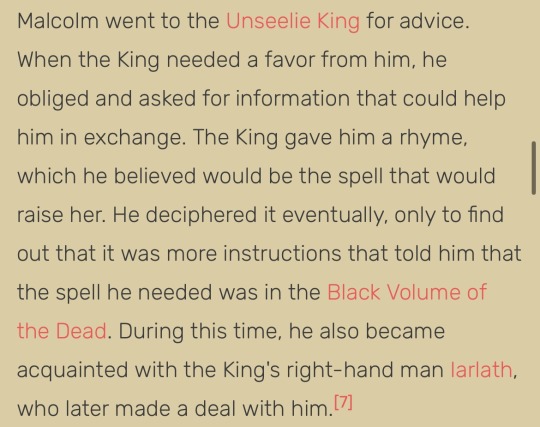
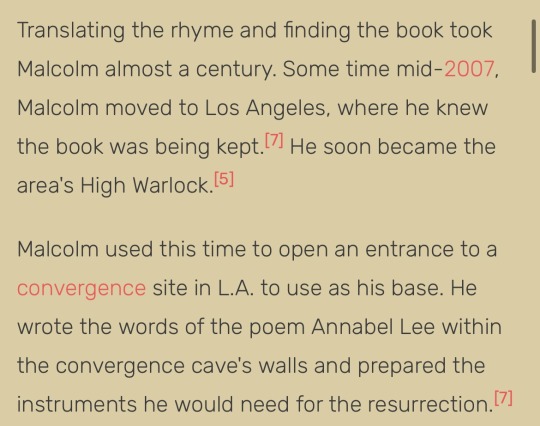
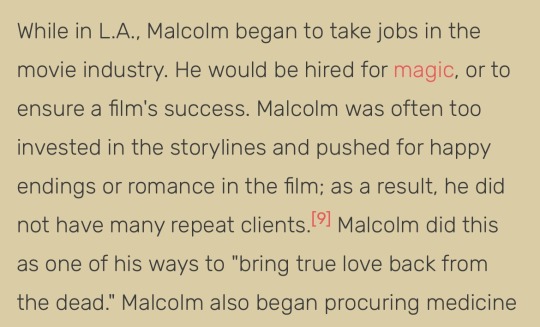
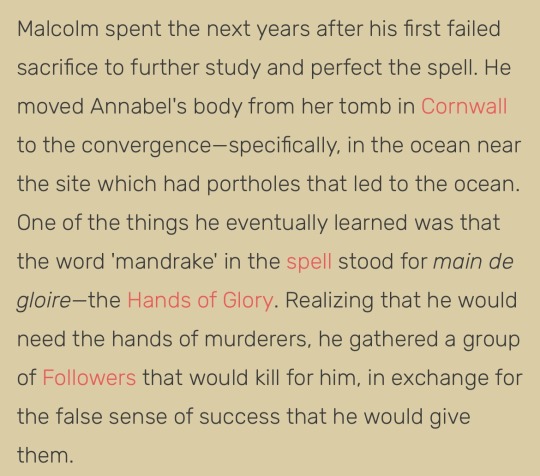
16 notes
·
View notes
Text
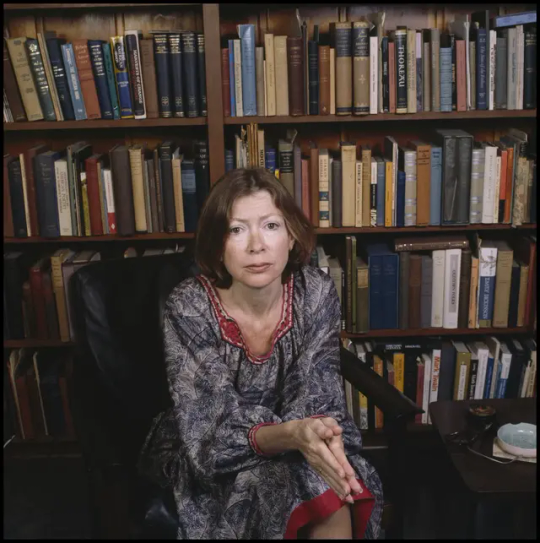
Joan Didion’s ‘astonishingly intimate’ diary to be published
The author recorded her thoughts on alcoholism, depression and her complex relationship with her daughter Quintana in the book, Notes to John
A journal found in Joan Didion’s home is to be published in April.
Discovered in a filing cabinet next to the American writer’s desk after her death in 2021, Notes to John is addressed to Didion’s husband, John Gregory Dunne, who died in 2003. Its entries begin in December 1999, and recount sessions Didion was having with a psychiatrist at the time.
As we know from a letter she wrote to a friend at that time, her family had been having “a rough few years” when Didion started writing Notes to John. The psychiatrist sessions detailed in the journal include discussions of Didion’s childhood, alcoholism, depression and her adopted daughter, Quintana. Didion spoke in the sessions about her relationship with Quintana, who lived with mental illness and alcoholism, and died in 2005 aged 39.
According to UK publisher 4th Estate, an imprint of HarperCollins, the conversations Didion had with the psychiatrist “were central to Didion’s understanding of the themes she turned to in her brilliant late works, Where I Was From, The Year of Magical Thinking and Blue Nights.”
Kishani Widyaratna, publishing director at 4th Estate said: “It is a great honour to be bringing this extraordinary new book to readers. Notes to John offers us a deeply moving and astonishingly intimate portrait of the person behind the revered literary persona, and rare insight into the genesis of some Didion’s most treasured works.”
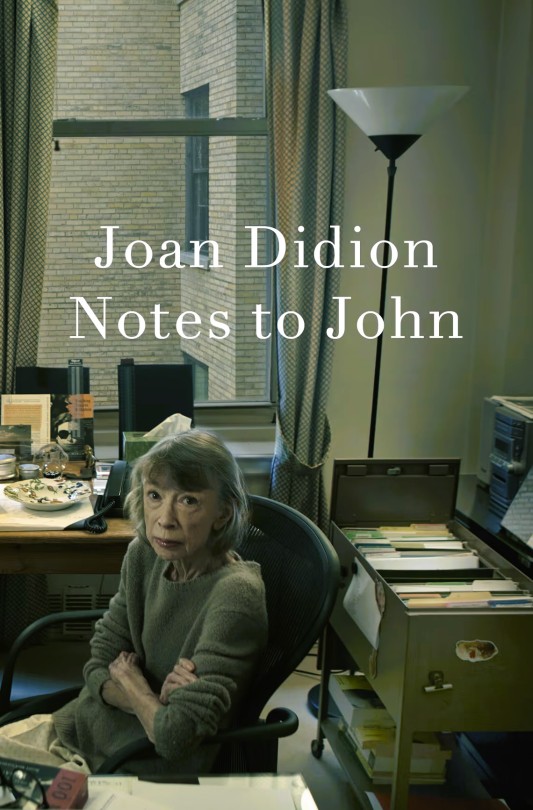
The announcement that these post-psychiatry notes, discovered by Didion’s literary executors in an unlabelled folder shortly after she died in 2021, are to be published in April has raised questions around the ethics of posthumous publishing.
Didion left no instructions to her trustees – her literary editor Lynn Nesbit, and two of her longtime editors, Shelley Wanger and Sharon DeLano – about how to handle the deeply private journal after her death from complications of Parkinson’s disease.
In total, 46 entries were found – printed out and placed in chronological order – in a portable filing cabinet next to her desk. They will be published in their entirety, with only minimal editing, such as footnotes and corrections of typos, under the title Notes to John.
The book is already being hyped as “an unmissable publication” from “one of the most iconic writers of our time” by its UK publisher 4th Estate, an imprint of HarperCollins. According to the publisher, the “meticulous” notes of conversations Didion had with her psychiatrist were central to Didion’s understanding of the themes she turned to in her celebrated late works, such as her memoirs The Year of Magical Thinking and Blue Nights, in which she writes about Quintana and John’s deaths.
A close friend of Didion, who wished to remain anonymous, told the Observer: “I have no doubt that this document will further our collective astonishment at Joan’s work, but I also cannot think of anything more private than notes kept about one’s psychiatry sessions. It’s not my place to say what Joan would have wanted, but as someone who loved her very much, the publication of these pages makes me terrifically sad.”
They said that, after discovering that Didion’s literary executors had decided to publish the notes, several of Didion’s closest friends and family members had shared similar feelings of disappointment and anguish: “The collective feeling in her inner circle is that her privacy has been betrayed … While I, of course, understand the public thirst for this document, given Joan’s extraordinary place in American letters, Joan was nothing if not meticulous and intentional with the details she decided to share – and not share – in The Year of Magical Thinking and Blue Nights. Anything beyond that seems to me a tremendous betrayal of her privacy by the people she trusted the most.”
Dr Rod Rosenquist, who lectures at the University of Northampton on the ethics of posthumous publishing, said the journal was bound to generate interest due to the “cult of Joan Didion”, which saw items such as her $12 blank notebooks fetch $9,000 at the auction of her estate by her heirs in 2022. “She is a celebrity writer within literary circles … and what I think is so interesting about public figures is that they are owned – manipulated in some ways – by the public,” he said.
Readers are hungry to better understand the inner life of an author they admire, he added: “That’s the very nature of celebrity.”
It is for this reason that writers such as Henry James and Charles Dickens burned their personal papers while they were still alive. But since Didion did not do this or instruct her literary executors not to publish the notes, leaving them “carefully organised” near her desk, where they were bound to be found, then “legally everyone’s acting within their rights and acting in ways that the market encourages them to act”, he said.
On an ethical and emotional level, however, he personally found the decision to publish Notes to John “disturbing”: “I don’t feel comfortable with anyone’s private journals being published this early.” Although there has been “public interest” in posthumously publishing the journal of a great writer many years after their death, he thinks that, even in these circumstances, therapy should be protected. “That’s my position. But I do think it’s debatable.”
Paul Bogaards, a spokesperson for the Didion Dunne Literary Trust, said the trust “respectfully declined” to comment.
Didion’s biographer, Tracy Daugherty, said he did not think Didion – “a careful curator of her image” – would have assumed that the personal nature of the journal protected it from “those who’d want to make it public”. “She was not naive about either publishing or human nature … Leaving behind something as rich as this journal promises to be could not be accidental.”
Didion was in decline in her later years but she was not incapacitated, he said. “She had to know that this journal would be, in her terms, ‘gold’.”
Joan Didion was born in Sacramento, California, in 1934 and worked as a journalist before publishing her first novel, Run River, in 1963. She went on to write four more novels including A Book of Common Prayer and Democracy. She was also well known for her essays such as Goodbye to All That and The White Album, and her memoir The Year of Magical Thinking won the National Book Award for nonfiction in 2005. In 2013, she was presented with a National Humanities Medal by Barack Obama and, in the same year, she won the PEN Center USA’s Lifetime Achievement award.
“I write entirely to find out what I’m thinking, what I’m looking at, what I see and what it means,” Didion said of her work.
Daily inspiration. Discover more photos at Just for Books…?
11 notes
·
View notes
Note
Do you think there’s any more significant Beatles info yet to be revealed? Either by Paul or Ringo or another party revealing something, or by letters/diaries/etc being published (presumably following someone’s death)? I tend to be pretty skeptical there’s actually anything major that ever will be made public that isn’t already known in some way, but recently I’ve seen some people speculating about what might come out once Yoko passes.
I think as time passes more letters and diaries will surely come to light, though it's hard to say if that'll happen even within our lifetimes. I'm specifically thinking about things like John's diaries and Paul's memoire about being in jail in Japan, which we know for a fact exist (unless Yoko ended up destroying John's diaries after the whole Prisoner of Love thing… god I hope not). There may also be some accounts about Paul and Ringo that will surface once they pass on, however, due to the fact they've outlived so many Beatle era people, I would doubt these accounts would be about the '60s period.
Whether any of these things will reveal huge bombshells is less certain, but I guess that also depends on what you'd count as a bombshell. There's huge swaths of these guys' lives we really don't know, so the likelihood that there's SOME skeleton or secret isn't discountable, though I'm also not personally convinced much more super crazy stuff will come out.
On the other hand, I really don't buy the idea that Paul (or Ringo) is holding back some "big reveal" until after Yoko dies. Yoko has not made public appearances in years now; if Paul really needs to say something, he can say it now, and he's going on eighty-three himself so why wait more? I'd sooner believe he has some posthumous statement of his own waiting, but even there I'm not expecting anything.
As far as I can tell, the idea that Paul has some "reveal" planned for after Yoko's death is entirely based on his 1981 phone call rant with Hunter Davies:
“I have some juicy stuff I could tell about John. But I wouldn't. Not when Yoko's alive, or Cynthia.”
Sorry, for being indelicate but this actually really frustrates me: the above quote isn't a fucking promise, it's a rant by a grieving man lashing out over his murdered erstwhile best friend's wife declaring him to have unequivocally been the person who hurt said best friend the most. That's the context of this quote. Paul is saying "I have dirt on John because I spent a decade beside him, but I have the decency not to air that out publicly in a way that would hurt his loved ones". (And he's almost certainly implying he knows for a fact John cheated on his wives [+ details] which would not ACTUALLY be a bombshell reveal but would probably have upset Cynthia or Yoko if he'd talked about it publicly.)
13 notes
·
View notes
Text
just ordered posthumous joan didion diaries nothing can ruin my weekend now

8 notes
·
View notes